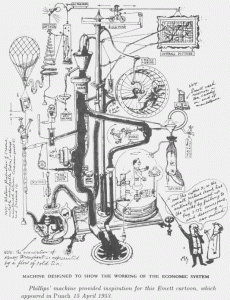Neoliberalism. I’ve been dipping into [amazon_link id=”1107671191″ target=”_blank” ]Prisoners of Reason: Game Theory and Neoliberal Political Economy[/amazon_link] by S.M.Amadae. This book argues that game theory (and particularly the Prisoner’s Dilemma) has been a key organising principle and political weapon of neoliberalism. That public policy sees all social and economic relations through the lens of strategic (non-co-operative) interaction by rationally maximising individuals. That Dr Strangelove won the cold war, and won the battle of domestic politics too, shaping modern capitalist society in his own image. The book draws a line from nuclear strategy to thinking about global warming and everything in between.
[amazon_image id=”1107671191″ link=”true” target=”_blank” size=”medium” ]Prisoners of Reason[/amazon_image]
It seems to me that a large part of S.M.Amadae’s objection is to the idea of ‘rational’ self-interested agents at all, not just to the assumption made in game theory models (and for my tastes the book should have been more careful about distinguishing co-operative from non-co-operative games). She clearly objects to ‘neoliberalism’. My heart leapt, briefly, when I saw a section titled ‘Defining neoliberalism’. It says: “Neoliberalism has a number of agreed-upon facets. All value is commodified and financialized. Work and gradual wealth accumulation are replaced with speculation, risk management and casino finance. …. Experts denounce the possibility for collective actions. … ” This is such a straw man that it didn’t help me at all. Sure, financial markets ran amok, and many – most? – economists identify regulatory, political and ethical failures behind that. Still, there are hardly any of us who think collective action to address climate change is impossible, still less undesirable. Yet it does not seem to me to make us neoliberal if we argue that it’s hard to achieve, that game theory can help us understand why, that we should use market incentives to reduce emissions when possible etc. Yet I suspect Amadae believes we are all neoliberals.
She also seems to believe Richard Dawkins’ [amazon_link id=”0199291152″ target=”_blank” ]The Selfish Gene[/amazon_link] is a key building block of neoliberalism, giving an evolutionary justification to the use of a game theoretic approach. It wasn’t clear to me what she actually thinks about evolutionary theory per se – is it only the Dawkins version she rejects? – or whether or not it’s a good idea for economics and social science to be consistent with evolutionary biology. She certainly doesn’t like it that evolutionary biologists use game theory, which is quixotic. This chapter ends: “In game theory, norms are Nash equilibria to games in which actors’ preferences and strategies are encoded to result in regularized patterns of play. The only ways to modify the outcomes are to apply incentives or to shock the system such that possibly another stable mutual-best-reply equilibrium could emerge.” The second of these sentences is not correct. Incentives won’t modify the outcomes – that’s the point about a Nash equilibrium. And shock is not the only way to change things. Co-operation to create a new focal point – or changing the rules of the game, the preferences, another, as [amazon_link id=”0691173699″ target=”_blank” ]Kaushik Basu[/amazon_link] for one has discussed.
[amazon_image id=”B01GI5F2FS” link=”true” target=”_blank” size=”medium” ]The Selfish Gene: 40th Anniversary edition (Oxford Landmark Science)[/amazon_image]
Perhaps we economists ought to stop using £ or $ as a unit of measurement in some areas of our work. It seems to me that at least some of the anger about ‘financialization’ and ‘marketization’ in ‘neoliberalism’ stems from the habit of converting all figures in the trade-offs being considered into monetary terms. Opportunity cost could be measured in butterflies, or bitcoin. It isn’t marketization; it’s physics and logic to point out that the same resource, time or land or oil, can’t be used twice. Economists certainly ought to be more willing to talk about social influences and about what forms preferences and about power. But – as ever – I find the N-word, neoliberalism, obscures more than it clarifies. Amadae cites Philip Mirowski’s [amazon_link id=”0521775264″ target=”_blank” ]Machine Dreams[/amazon_link], which I thought a highly ideological book. For me, Paul Strathern’s [amazon_link id=”067697449X” target=”_blank” ]Doctor Strangelove’s Game[/amazon_link] is a straighter account of the role of game theory – not at all uncritical – and E Roy Weintraub’s [amazon_link id=”0822312530″ target=”_blank” ]Toward a History of Game Theory[/amazon_link] a detailed historical study of its importance in economics.
[amazon_image id=”0521775264″ link=”true” target=”_blank” size=”medium” ]Machine Dreams: Economics Becomes a Cyborg Science[/amazon_image] [amazon_image id=”067697449X” link=”true” target=”_blank” size=”medium” ]Dr. Strangelove’s Game : A Brief History of Economic Genius[/amazon_image] [amazon_image id=”0822312530″ link=”true” target=”_blank” size=”medium” ]Toward a History of Game Theory (History of Political Economy Supplement) (History of Political Economy: Annual Supplement)[/amazon_image]

